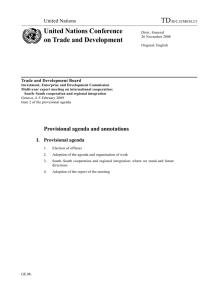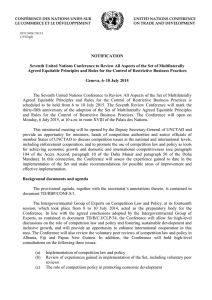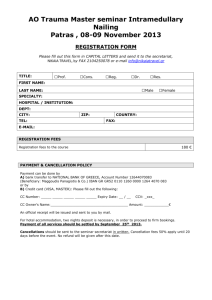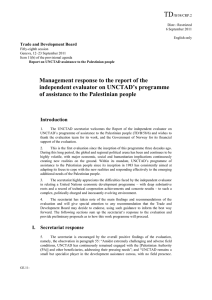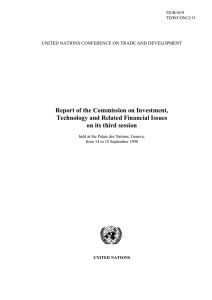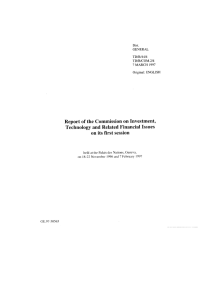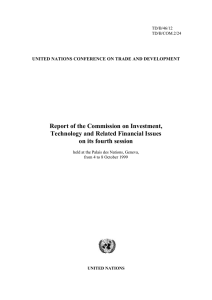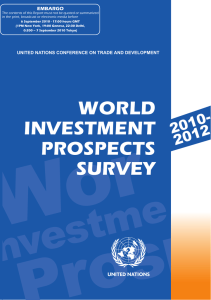TD United Nations Conference
advertisement
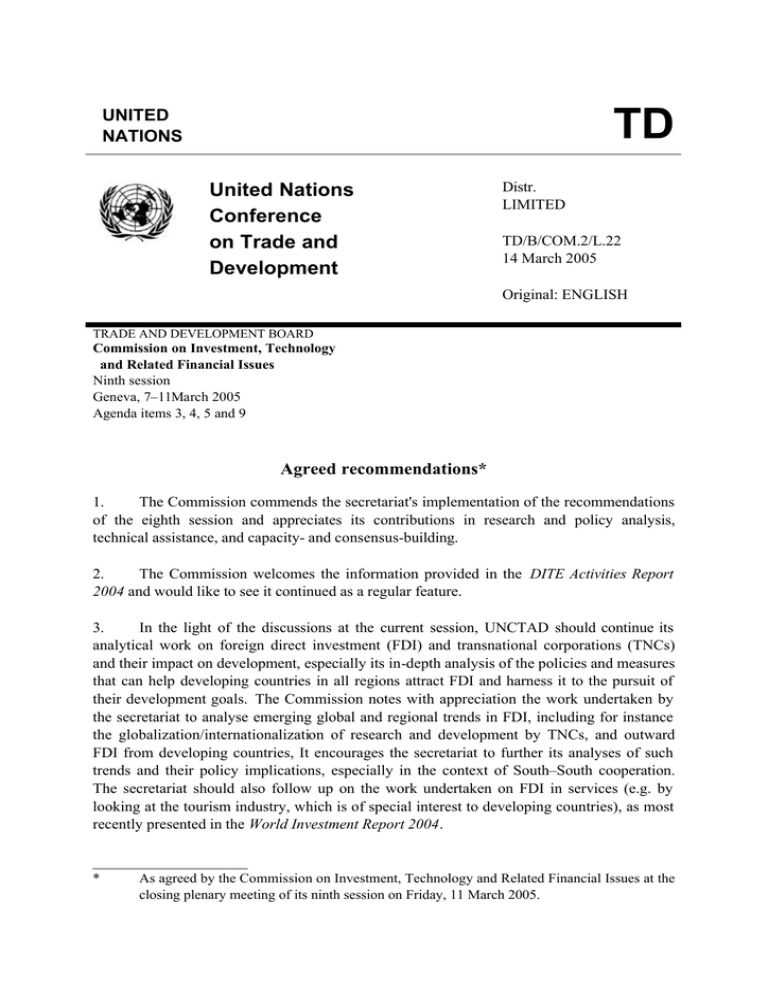
TD UNITED NATIONS United Nations Conference on Trade and Development Distr. LIMITED TD/B/COM.2/L.22 14 March 2005 Original: ENGLISH TRADE AND DEVELOPMENT BOARD Commission on Investment, Technology and Related Financial Issues Ninth session Geneva, 7–11March 2005 Agenda items 3, 4, 5 and 9 Agreed recommendations* 1. The Commission commends the secretariat's implementation of the recommendations of the eighth session and appreciates its contributions in research and policy analysis, technical assistance, and capacity- and consensus-building. 2. The Commission welcomes the information provided in the DITE Activities Report 2004 and would like to see it continued as a regular feature. 3. In the light of the discussions at the current session, UNCTAD should continue its analytical work on foreign direct investment (FDI) and transnational corporations (TNCs) and their impact on development, especially its in-depth analysis of the policies and measures that can help developing countries in all regions attract FDI and harness it to the pursuit of their development goals. The Commission notes with appreciation the work undertaken by the secretariat to analyse emerging global and regional trends in FDI, including for instance the globalization/internationalization of research and development by TNCs, and outward FDI from developing countries, It encourages the secretariat to further its analyses of such trends and their policy implications, especially in the context of South–South cooperation. The secretariat should also follow up on the work undertaken on FDI in services (e.g. by looking at the tourism industry, which is of special interest to developing countries), as most recently presented in the World Investment Report 2004. ____________________ * As agreed by the Commission on Investment, Technology and Related Financial Issues at the closing plenary meeting of its ninth session on Friday, 11 March 2005. TD/B/COM.2/L.22 Page 2 4. Noting the crucial need of a number of developing countries, especially least developed countries (LDCs), to enhance their capacity in FDI data collection and analysis, the Commission requests the secretariat to intensify its support, in cooperation with other relevant international agencies, of developing countries' efforts in this area. 5. In the light of the discussion at the current session, the Commission requests the secretariat to continue its work on international investment and technology transfer arrangements, with emphasis on bilateral and regional dimensions and an exchange of experiences in implementing international commitments in this regard. Particular attention should be paid to monitoring emerging issues and developments, including in the field of investor–State dispute settlement, and related analytical and technical assistance work in this area. 6. The Commission took note of the report of the Expert Meeting on Good Governance in Investment Promotion and the suggestions contained therein. It recommends that the secretariat further strengthen its programme on Good Governance in Investment Promotion (GGIP) and extend its assistance to more interested developing countries, in particular LDCs, in implementing measures to improve good governance in investment promotion. Among other things, the secretariat should continue to support host country Governments, including through policy advocacy and capacity-building in investment promotion agencies, and further work on corporate governance, including that of ISAR. In carrying out these functions, the secretariat should ensure synergies between its GGIP programme and other related activities of the Division and its work on investment policies, especially the investment policy reviews, which will help to ensure that the impact of such programmes is sustainable. 7. The Commission commends the assistance provided to developing countries through investment policy reviews and the follow-up process in the implementation of recommendations contained therein. Further support is needed to ensure that other interested countries also benefit from evaluations and improvement in their investment policy framework. The effectiveness of investment policy reviews is measured by the extent to which key recommendations are implemented and their impact is maximized. To that end, concerted efforts are needed by development partners, the secretariat and other international organizations to support the implementation of relevant recommendations through follow-up projects. The Commission welcomes the implementation report on the Investment Policy Review of Egypt, and recommends that UNCTAD continue this series of reports for other interested countries, so as to evaluate progress in the implementation of recommendations and identify further measures that need to be taken to bring about effective implementation. The Commission also welcomes the Blue Books on Best Practice in Investment Promotion and Facilitation as an additional device to encourage timely implementation of recommendations. Efforts should also be made to disseminate, as widely as possible, specific lessons arising from investment policy reviews and follow-up activities carried out by UNCTAD. This could be achieved through UNCTAD’s existing intergovernmental forum and by preparing short investment policy briefs aimed at policy makers and investment promotion agencies. TD/B/COM.2/L.22 Page 3 8. The Commission welcomes the interaction with the World Association of Investment Promotion Agencies (WAIPA) in support of the efforts of developing countries to attract beneficial FDI and requests that the practice of joint sessions be continued. It encourages the secretariat to further enhance this cooperation, including particularly in the context of the Investment for Development Partnership and with a view to strengthening the exchange of experiences and best practices and the dissemination of UNCTAD's analytical work and policy advice. 9. The Commission underlines the important contribution that investment, technology and enterprise competitiveness can make in achieving the international development goals, including those contained in the Millennium Declaration. In the light of the discussions at the current session, UNCTAD should: (a) Support country-level processes of policy formulation and implementation, with a view to assisting countries in maximizing the benefits that FDI can bring to achieving the international development goals, including through the UNCTAD programmes of investment policy reviews, investment guides, enterprise linkage development and related advisory services and capacitybuilding; (b) Assist Governments of developing countries in their efforts to create an enabling regulatory environment for public–private partnerships and investment in enterprises and projects providing basic services to the poor; (c) Within its work programme on investment, technology transfer and intellectual property, assess ways in which developing countries can develop their domestic productive capability in the supply of essential drugs in cooperation with pharmaceutical companies; (d) Assist Governments of developing countries in promoting the application of science and technology in achieving the international development goals, including those contained in the Millennium Declaration, in particular through the UNCTAD science, technology and innovation policy reviews and the work of the Commission on Science and Technology for Development (CSTD). The Commission welcomes the partnership between UNCTAD and the Geneva Centre for Information Technologies to provide training to engineers and information professionals from developing countries and LDCs; (e) Continue analytical work and the exchange of information and experiences in the area of positive corporate contributions to the social and economic development of host developing countries, as foreseen by the São Paulo Consensus, including in paragraph 45; (f) Engage stakeholders in action-oriented policy dialogue, including through the UNCTAD/ICC Investment Advisory Council. 10. The Commission notes with appreciation the efforts made by the secretariat in ensuring cooperation with other international organizations in carrying out its work. _______


